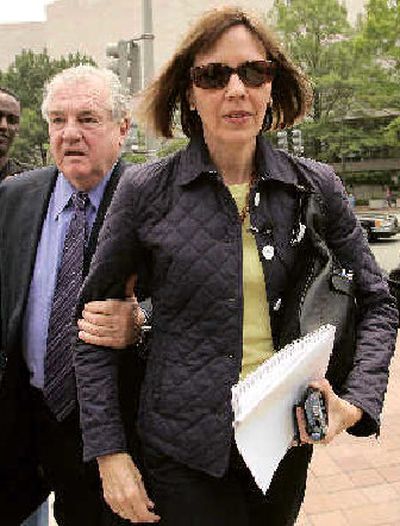Reporter who won’t reveal source jailed

WASHINGTON – In a stinging rebuke to the news media, a federal judge on Wednesday jailed a New York Times reporter for refusing to answer questions before a grand jury and suggested that the reporter could be charged with obstruction of justice if she continues to resist.
U.S. District Judge Thomas F. Hogan said sentencing Judith Miller to four months in jail might cause her to relent and testify in a special prosecutor’s investigation into whether Bush administration officials illegally leaked the name of a CIA operative to reporters.
“Miller says she recognizes that no one is above the law, yet she refuses to testify,” Hogan said to a packed courtroom. “The court has to take some action to try to get her to comply.”
A second reporter, Time magazine’s Matthew Cooper, agreed to testify, and Hogan said he wouldn’t be jailed. Cooper said his source had contacted him and waived their confidentiality agreement.
“Last night, I hugged my 6-year-old son goodbye and told him I was not sure when I would see him again,” Cooper said, adding that the situation changed dramatically when his source gave him permission to talk to prosecutors.
Hogan’s decision to jail Miller is the most serious test in decades of the news media’s ability to protect confidential sources. It comes in a case already fraught with political overtones, with allegations that Bush administration officials revealed the name of a CIA operative to punish her husband, a critic of the administration’s Iraq policy.
New York Times Executive Editor Bill Keller, standing outside the federal courthouse in Washington, denounced the decision and said it would discourage reporters from ferreting out public malfeasance.
“This is a chilling conclusion to an utterly confounding case,” he said. “It is confounding because of the mystery about exactly what crime has been committed and what exactly the special prosecutor hopes to accomplish by the draconian act of punishing an honorable journalist.
“It is chilling because it’s likely to serve future cover-ups of information that happen in the recesses of government and other powerful institutions.”
In an interview later, Keller said growing public enmity toward the press had created an atmosphere in which prosecutors feel more inclined to prosecute reporters and judges feel more inclined to send them to jail.
“There is a poison in the atmosphere,” Keller said.
Hogan said Miller, a Pulitzer Prize-winning reporter, would remain in jail until the term of the grand jury investigating the leak case ends in October or until she agrees to testify.
The case began two years ago when Joseph C. Wilson IV, a former ambassador, published an article alleging that the Bush administration had manipulated intelligence to exaggerate Saddam Hussein’s weapons programs.
Several days later, Robert Novak, a syndicated columnist, published a column identifying Wilson’s wife, Valerie Plame, as a CIA operative. The column quoted two senior administration officials as saying Plame had recommended her husband for a CIA fact-finding trip to Niger. Wilson said he gathered information during the trip that led him to believe that the Bush administration had manipulated intelligence.
Miller didn’t write anything about Plame, but she apparently did talk to administration officials about Novak’s column. Cooper published a small item. Earlier, Time magazine agreed to turn over Cooper’s notes.
In an impassioned statement before her sentencing, Miller insisted that she had no choice but to uphold the agreement she had with her source not to divulge that person’s identity.
“A promise of confidentiality, once made, must be honored or the public will suffer,” Miller said. “In this case, I cannot break my word. The right of civil disobedience is based on personal conscience, it is fundamental to our system and it is honored throughout history.”
Special prosecutor Patrick Fitzgerald said Miller was seeking constitutional privileges available not even to the president.
“I would love to promise confidentiality (to potential witnesses) and say tell me everything you know and I will never, never tell anyone,” Fitzgerald said. “We can’t do that. We can’t let 54,000 journalists have a power that no one else has.”
Fitzgerald said that a crime may have been committed and that Miller, by refusing to come forward, is preventing prosecutors from getting to the bottom of it.
What crimes may have been committed, though, are unclear, and Fitzgerald’s critics, among them Keller of the New York Times, faulted the prosecutor for giving no hint as to what kind of wrongdoing he’s pursuing.
Leaking the name of a covert CIA operative is illegal, and Novak’s column produced angry calls for an investigation, including from the New York Times editorial page. Novak has declined to discuss his role in the case and hasn’t said whether he testified before the grand jury or how he has avoided facing jail time.